ACCLAIM FOR
Robert D. Kaplans
The Ends of the Earth
Rousing, immensely readable. Kaplan sends us invaluable dispatches from places that, in the media and the public mind, have almost ceased to exist.
Village Voice
Kaplan has read widely and obscurely. He knows a lot about a lot of things. A true travelogue.
Los Angeles Times
Robert Kaplan writes with authority. [He] brings to this book a journalists keen eye for detail [and] evokes all the adventure of Third World travel.
Chicago Tribune
A writer who has paid his dues in discomfort, dysentery and unwelcome adrenaline rushes. Mr. Kaplan has charted the belly of the beast from the inside out.
Dallas Morning News
Brilliant terrifying beautifully written, superbly researched, courageously traveled.
William Shawcross
Eloquently illustrated and documented.
Peter Matthiessen
Kaplans images are mesmerizing, beautiful and sad. His conclusions [are] grounded in the grit of life. The world he brings home in The Ends of the Earth demands our attention.
People
A riveting travelogue.
Time
Ambitious challenging and engrossing.
Publishers Weekly
Books by Robert D. Kaplan
Warrior Politics: Why Leadership Demands a Pagan Ethos
Eastward to Tartary: Travels in the Balkans, the Middle East, and the Caucasus
The Coming Anarchy: Shattering the Dreams of the Post Cold War
An Empire Wilderness: Travels into Americas Future
The Ends of the Earth: From Togo Turkmenistan, from Iran to Cambodia, a Journey to the Frontiers of Anarchy
The Arabists: The Romance of an American Elite
Balkan Ghosts: A Journey Through History
Soldiers of God: With the Islamic Warriors in Afghanistan and Pakistan
Surrender or Starve: Travels in Ethiopia, Sudan, Somalia, and Eritrea
Robert D. Kaplan
The Ends of the Earth
Robert D. Kaplan is a correspondent for The Atlantic Monthly and the bestselling author of numerous books on foreign affairs and travel, including Balkan Ghosts, The Coming Anarchy, and Eastward to Tartary. He is a senior fellow at the New American Foundation in Washington. He lives with his wife and son in western Massachusetts.
 FIRST VINTAGE DEPARTURES EDITION, FEBRUARY 1997
FIRST VINTAGE DEPARTURES EDITION, FEBRUARY 1997
Copyright 1996 by Robert D. Kaplan
Maps copyright 1996 by David Lindroth
All rights reserved under International and Pan-American Copyright Conventions. Published in the United States by Vintage Books, a division of Random House, Inc., New York, and simultaneously in Canada by Random House of Canada Limited, Toronto.
Originally published in hardcover by Random House, Inc., New York, in 1996.
Grateful acknowledgment is made to the following for permission to reprint previously published material:
Dover Publications, Inc.: Excerpts from Wandering in West Africa by Richard Burton.
Reprinted by permission of Dover Publications, Inc.
Harcourt Brace & Company: Excerpt from Shah of Shahs by Ryszard Kapuciski. Copyright 1982 by Ryszard Kapuciski. English translation copyright 1985 by Harcourt Brace & Company. Reprinted by permission of the publisher.
HarperCollins Publishers: Excerpt from Ecocide in the USSR by Murray Feshbach. Copyright 1982 by Murray Feshbach and Alfred Friendly, Jr. Reprinted by permission of HarperCollins Publishers.
Little, Brown and Company: Excerpt from Journeying by Nikos Kazantzakis, published by Little, Brown and Company. Reprinted by permission.
The Octagon Press Ltd.: Excerpt from The Teachings of Hafiz. Reprinted by permission of The Octagon Press Ltd., London.
Princeton University Press: Ten lines from Growing in Spirit from Collected Poems: C. P. Cavafy, edited by Edmund Keeley and Philip Sherrard (Princeton University Press, 1975; revised edition, 1992). Copyright 1975 by Edmund Keeley and Philip Sherrard. Reprinted by permission of Princeton University Press.
Yale University Press: Excerpt from Roots of Revolution by Nikki R. Keddie and Richard Yann (Yale University Press, 1981). Copyright 1981 Yale University. Reprinted by permission of Yale University Press.
The Library of Congress has cataloged the Random House edition as follows:
Kaplan, Robert D., 1952
The ends of the earth : a journey at the dawn of the 21st century / by Robert Kaplan.1st Vintage ed.
p. cm.
Originally published: New York : Random House, C1996.
ISBN 0-679-75123-8
eBook ISBN: 978-0-8041-5348-5
1. AsiaDescription and travel. 2. Africa, WestDescription and travel. 3. Middle EastDescription and travel. 4. Kaplan, Robert D., 1952 JourneysAsia. 5. Kaplan, Robert D., 1952 JourneysAfrica, West. 6. Kaplan, Robert D., 1952 JourneysMiddle East. I. Title.
DS10.K345 1997
910.91811dc20 96-28272
Random House Web address: http://www.randomhouse.com/
Author photograph Mohammed el Dakhakhny
v3.1
To Dick Hoagland, Ernest Latham, Kiki Munshi
and Graham Miller:
three diplomats and a relief worker
His face is turned towards the past. Where we perceive a chain of events, he sees one single catastrophe which keeps piling wreckage upon wreckage and hurls it in front of his feet. The angel would like to stay, awaken the dead, and make whole what has been smashed. But a storm is blowing from Paradise; it has got caught in his wings with such violence that the angel can no longer close them. This storm irresistibly propels him into the future to which his back is turned, while the pile of debris before him grows skyward. This storm is what we call progress.
WALTER BENJAMIN , in Illuminations writing about the Angel of History
The good geographer is a philosopher.
CARLETON S. COON, SR .,
Caravan: The Story of the Middle East
Strife is the origin of everything.
HERACLITUS
We all dwell in one country, O stranger, the world.
MELEAGER
Contents
Preface
JACK LONDON WRITES in Martin Eden that a reporters work is all hack from morning till night it is a whirlwind life, the life of the moment, with neither past nor future I have attempted to escape this restriction. In Balkan Ghosts, an earlier book of mine, completed before the outbreak of the war in Yugoslavia, I tried to see the present in terms of a difficult and bloody past. In The Ends of the Earth, I have tried to see the present in terms of the future, on the whole an ominous one for a significant part of the third world.
This is a travel book. It is concrete to the extent that my ideas arise from personal experience. It is subjective, given that no two travelers interpret a people and landscape in the same way. It is idiosyncratic: I spent relatively more time in Iran than in other places, and the text reflects that. Noras a record of one persons travelsis it comprehensive: India and China receive less coverage than they deserve, South America is missing, and so on. From the standpoint of many backpackers and relief workers, my journey was not arduous. Think of it as a brief romp through a swath of the globe, in which I try to give personal meaning to the kinds of issues raised in Paul Kennedys





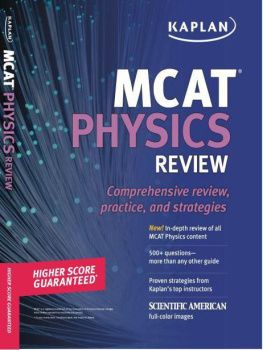
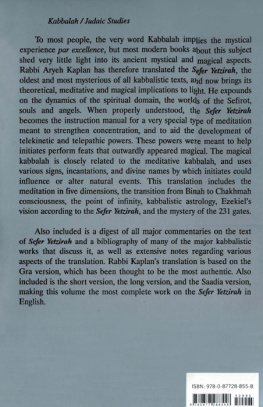

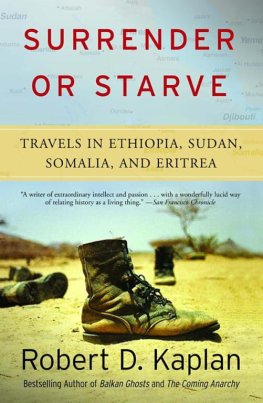






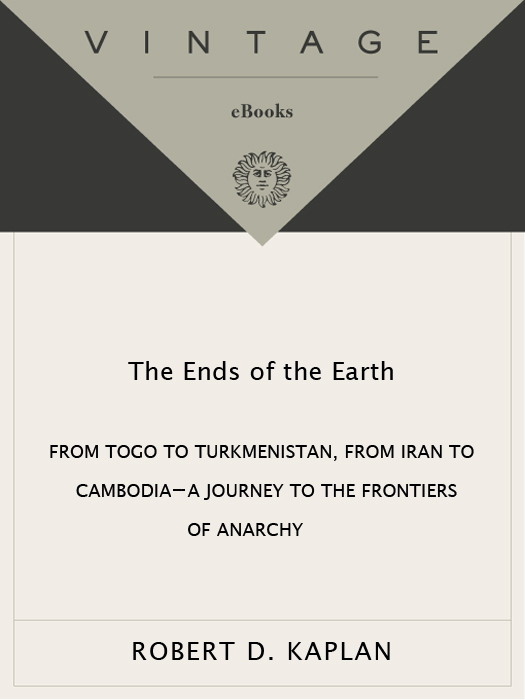
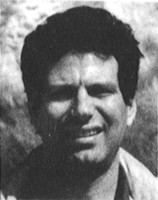
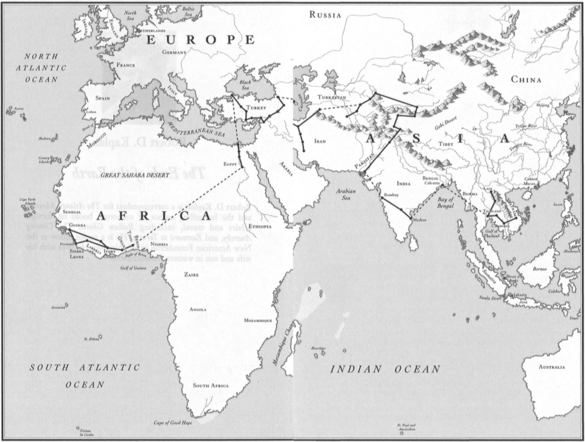
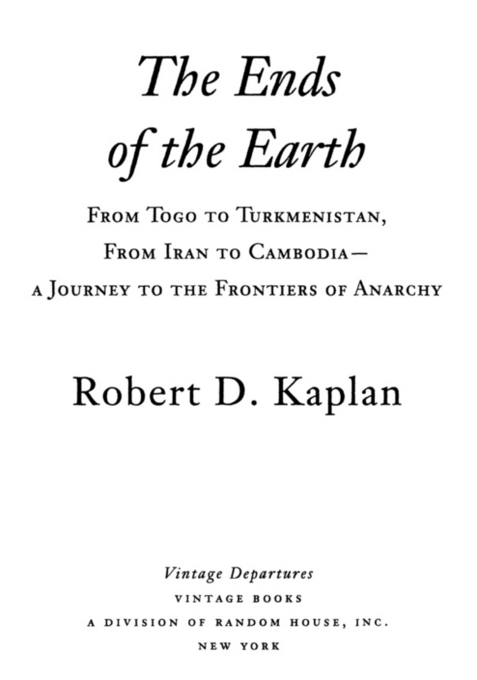
 FIRST VINTAGE DEPARTURES EDITION, FEBRUARY 1997
FIRST VINTAGE DEPARTURES EDITION, FEBRUARY 1997